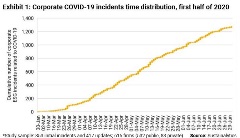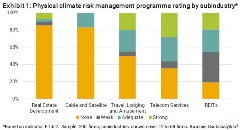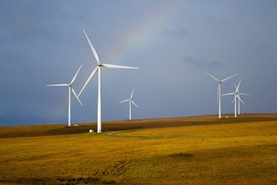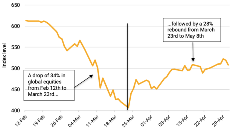What are Sustainability Linked Loans (SLLs)?
A Sustainability Linked Loan is focused on incentivizing sustainability improvements among corporate borrowers by linking the terms of the loan to their overall sustainability performance targets. SLLs can be used for general corporate purposes as the terms are tied solely to the borrower’s ESG-related performance.
Beer, Wine & Spirits in the Era of COVID-19
Companies operating in the Beer, Wine and Spirits subindustry have suffered from knock-on effects of COVID-19 lockdown measures, as governments across the globe have moved to close hotels, bars and restaurants, and ban large events and gatherings, such as festivals and sports events. Given that these venues are an important source of revenue for alcohol companies, investors within this space may benefit from a closer look at how firms have adapted to the rapidly changing market conditions.
Corporate ESG Ratings in Latin America: Use Cases for Companies and Banks | Webinar
To take advantage of the demand for ESG-related disclosure and communicate their sustainability achievements to internal and external stakeholders, many forward-looking companies are leveraging ESG information in their capital raising activities and marketing efforts.
Coronavirus: Are We Protecting the Most Vulnerable?
As the COVID-19 pandemic swept across the globe at the start of 2020, frontline medical care became a top priority in stopping the virus. Contrary to the improvement in case management at hospitals, the number of cases in long term care homes (LTCH) rose sharply. With the situation evolving by the hour at times, the number of infections and deaths rose exponentially in the US.
Coronavirus: Food Security in a Global Pandemic
As Covid-19 continues to ravage the world, governments have responded with movement restrictions and border closures. While necessary to protect public health, these stricter safety measures are disrupting food supply chains globally, forcing prices upward and increasing the risk of social unrest.
Sustainable Fund Labels: Diverse Definitions of Sustainability
Sustainable financial products are marked with an increasingly large list of tags, from green, sustainable, socially responsible to thematic ESG, water, carbon or impact funds, and not every investor might know how to make sense of these terms. Sustainable fund labels can be one way to signal to the market that the fund has a dedicated responsible investment strategy.
How Investors Integrate ESG: A Typology of Approaches
This report, How Investors are Integrating ESG: A Typology of Approaches, classifies ESG integration approaches along three dimensions: management (who is integrating ESG), research (what is being integrated), and application (how the integration is taking place). The authors then used the typology to identify six prevailing approaches of ESG integration in the market today.
ESGarp Scores: In Search of Reasonably Priced, Low ESG Risk Stocks
The COVID-19 pandemic is likely to further amp up the market’s interest in ESG investment research. It’s not just that ESG funds and indices have generally outperformed their non-ESG counterparts since the COVID-19 sell-off began in mid-February.[i] It’s also that the pandemic itself has drawn attention to ESG issues ranging from biodiversity and habitat loss to employee relations and supply chain management.
Vehicles and Ventilators: An ESG Lens on Automakers Pivoting to COVID-19 Solutions
Automakers have been hit hard by the COVID-19 pandemic, with widespread plant closures, stalling demand for vehicles and mounting tensions between corporate management teams and government bodies. On the upside, several auto companies have responded to the global health crisis by pivoting parts of their business models to supply the growing demand for ventilators needed for patients suffering from severe respiratory symptoms of COVID-19.
2020: The Year of the Flexitarian
The Economist named 2019 the year of the vegan; however, veganism is one part of a much greater trend away from animal proteins. While vegetarianism also continues at a steady growth rate, it is the flexitarian – i.e. traditional meat eater who makes a conscious effort to reduce their meat intake – that is having a notable impact on the market. This has been further accelerated by COVID-19 and the disruption to the fresh meat industry.
Future of Cement: Low-Carbon Technologies and Sustainable Alternatives
At a time when climate change has caught global attention and efforts are being made to meet the UN sustainable development goals, however concrete – the most widely used man-made material on earth – is a significant source of carbon dioxide (CO2) emissions and often overlooked. Cement, a key ingredient in concrete, accounts for about 7% of global CO2 emissions and is the second-largest industrial emitter of CO2 after the iron and steel industry [i]. The cement production process is responsible for 95% of concrete’s carbon footprint. Under the International Energy Agency’s sustainable development scenario, cement producers will need to reduce their carbon intensity at an annual rate of 0.3% per tonne of cement produced up to 2030 [ii]. With carbon emission regulations tightening globally to meet the 2-degree scenario (2DS) targets, cement companies that fail to adopt low-carbon processes and improved energy efficiency could face risks in the form of potential fines from non-compliance and lost opportunity costs by failing to innovate processes.
Coronavirus: Are Companies Prepared to Take Care of Their Employees?
In April 2020, the International Labour Organisation (ILO)[i] estimated that in the second quarter of 2020 there will be a 6.7% decrease in working hours globally (approximately 195 million full-time employees), primarily in the sectors hardest hit by the Coronavirus pandemic: food service, manufacturing and retailing.
Climate Action, Human Health and Responsible Investing
This year, we mark Earth Day under a pandemic. To date, casualties of the novel coronavirus include more than 170,000 deaths, ongoing disruptions to healthcare systems and a deep economic downturn. As we face the first global recession in a decade, Earth Day – the theme of which this year is climate action – serves as a reminder for investors to reflect on how their investment activities relate to social and environmental health concerns.











.tmb-small.png?Culture=en&sfvrsn=fd535425_2)






